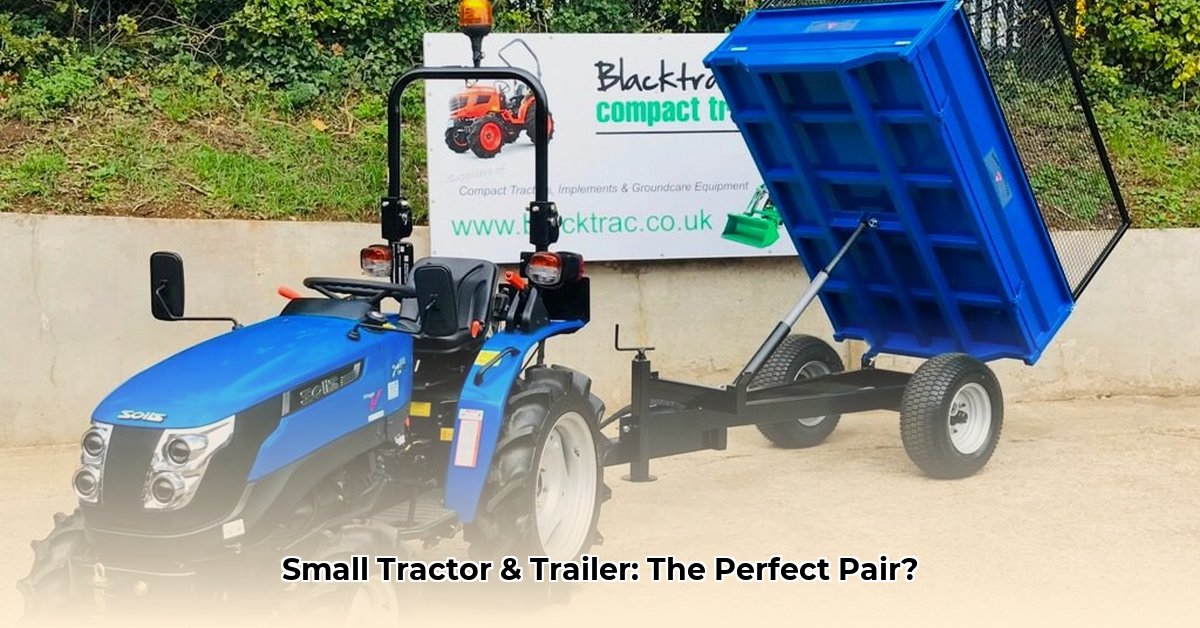
Choosing the Right Small Tractor and Trailer Combination
Selecting the ideal small tractor and trailer requires careful consideration of various factors. This guide helps you navigate the process, ensuring you choose a combination that meets your specific needs and budget. Whether you're a farmer, landscaper, or contractor, understanding key features and comparing options is crucial for making an informed decision. For even more resources, check out this helpful guide on miniature tractor trailers.
Assessing Your Needs: Preparing for the Purchase
Before exploring specific brands and models, define your intended use. What types of materials will you typically haul? What are their dimensions and weights? Understanding your workload – frequency of use, hauling distances, and the heaviest anticipated loads – directly influences the size, capacity, and features required in your tractor and trailer. For instance, a landscaper hauling mulch will have different needs than a farmer transporting hay bales. What's the heaviest single item you'll transport? This defines the minimum payload capacity needed.
Key Features to Consider
Several key features distinguish small tractor and trailer combinations. Understanding these aspects is essential for making a well-informed purchase.
Payload Capacity: This represents the maximum weight a trailer can safely carry. Always select a trailer with a higher capacity than anticipated; safety should never be compromised. (Payload Capacity: The maximum weight a trailer can safely carry.)
Trailer Type: Different trailer types cater to specific needs. Utility trailers are versatile all-purpose options. Tilt trailers simplify loading heavy or bulky items. Dump trailers are ideal for materials like gravel or dirt, enabling quick unloading. The optimal choice depends on the nature of your loads and preferred unloading method. (Trailer Type: The design of the trailer, e.g., utility, tilt, dump.)
Axle Configuration: Single-axle trailers are simpler and less expensive, but tandem (dual) axles offer superior stability and weight distribution, especially for heavier loads. Tandem axles significantly enhance stability, particularly when hauling substantial weights. (Axle Configuration: Number of axles supporting the trailer, influencing stability and load capacity.)
Hitch Compatibility: Ensure the trailer's hitch is compatible with your tractor's hitch receiver. Incorrect hitching poses a safety risk and can damage your equipment. (Hitch Compatibility: Ensuring the trailer hitch correctly connects to the tractor's hitch receiver.)
Braking System: For heavier trailers or longer hauls, brakes are critical for safety and control, particularly on inclines. (Braking System: Essential safety feature for heavier trailers, especially on slopes.)
Comparing Popular Brands: OrangeLine vs. Country Mfg
Two prevalent brands, OrangeLine and Country Mfg, offer various small tractor and trailer options. While exact pricing varies, we can analyze their relative strengths based on available information.
OrangeLine emphasizes robust construction and compatibility with Kubota tractors, potentially offering advantageous service and financing options through Kubota's network. However, more detailed specifications, especially concerning payload capacity, would be needed for a comprehensive comparison.
Country Mfg provides precise specifications for its 2-ton wagon, providing clear insights into its capabilities and limitations. Its straightforward design and readily available specs appeal to users prioritizing uncomplicated performance.
| Feature | OrangeLine | Country Mfg (2-Ton Wagon) | Considerations |
|---|---|---|---|
| Payload Capacity | Information not readily available | 2 tons | Crucial for selecting the appropriate trailer size. |
| Trailer Type | Utility; tilt bed possibly available | Utility | Evaluate loading and unloading requirements. |
| Axle Configuration | Details unclear | Single axle | Tandem axles enhance stability for heavier loads. |
| Kubota Compatibility | Designed for Kubota tractors | Not specified | A significant advantage if you own or plan to purchase a Kubota. |
Long-Term Costs and Financing
Financing options, such as those potentially available through Kubota for OrangeLine products, can ease initial investment costs. However, remember long-term costs encompassing maintenance, repairs, and eventual replacement. Investing in a durable, well-constructed trailer minimizes long-term expenses.
Making Your Decision
Choosing the ideal small tractor and trailer involves careful consideration of your specific needs, budget, and anticipated usage. Thoroughly research manufacturers' websites, explore detailed specifications, and examine user reviews. This approach minimizes costly mistakes and ensures ongoing efficiency. Considering potential future needs allows for a more adaptable and long-term beneficial investment.
"Matching trailer capacity to your tractor’s capabilities is paramount," advises John Miller, Agricultural Engineer at the National Agricultural Research Center. "Overloading can lead to serious mechanical failures and safety hazards."
“Don't underestimate the importance of regular maintenance,” adds Sarah Chen, Equipment Manager at a large farming cooperative. “Proper care significantly extends your trailer's lifespan and reduces repair costs.”
Key Takeaways:
- Matching trailer capacity to tractor towing capacity is crucial.
- Consider hauling frequency and distance when choosing trailer size.
- Prioritize safety features including brakes and secure tie-downs.
- Budget for maintenance and potential repairs.
- Research local regulations regarding trailer weight and safety features.
This comprehensive analysis provides a robust framework for selecting the optimal small tractor and trailer combination for your specific requirements. Remember to consult with equipment dealers and other experts for personalized guidance.